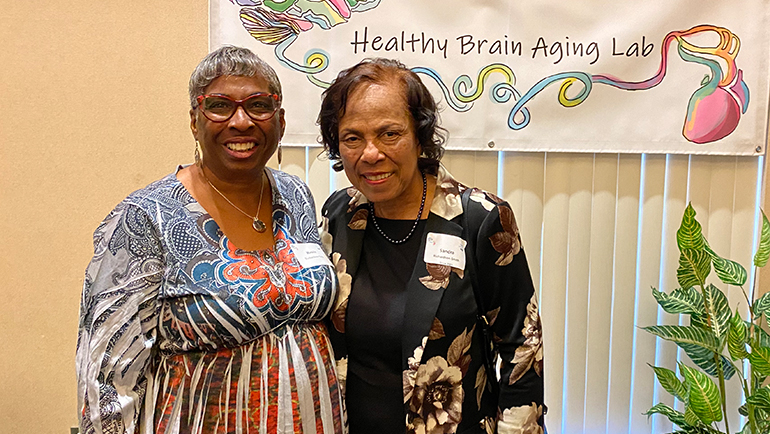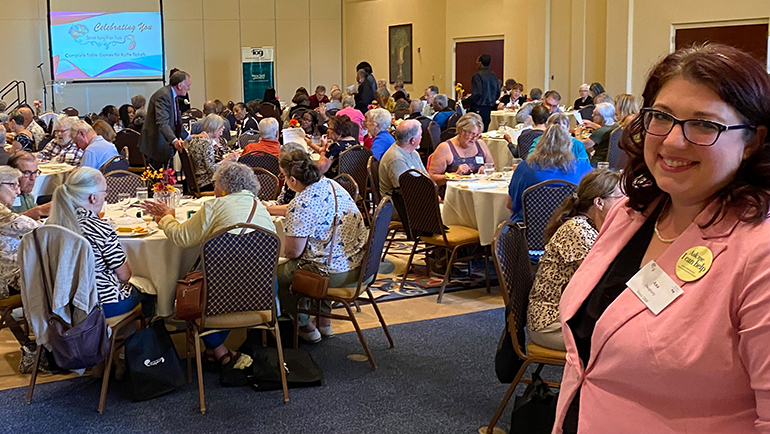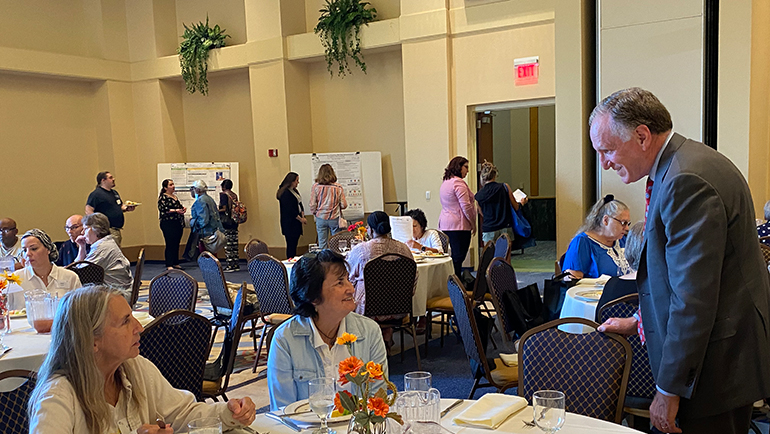
DETROIT – For 22 years, a committed group of 650 older volunteers has taken part in the Detroit Aging Brain Study at Wayne State University, a long-term look at the impact of aging on the architecture and function of the human brain. As the project prepares for its next five-year phase, Director Ana Daugherty, PhD, wanted to thank the people who participated and share what the research has yielded.
“We planned a reception with food and research posters and a presentation from me of the insights into brain health and aging from the study,” Daugherty said. “I’d never done this before and wasn’t sure if people would come.” Participants have undergone more than 1,150 brain scans and 8,300 hours of cognitive testing. “They have given us so much. We wanted to give back.”
They did come. The late September reception drew more than 200 attendees and guests, from as far north as Gaylord and as far south as Erie, Michigan. Barbara Ginther, 57, joined the study in 2019 and didn’t hesitate to make the 80-minute trek from Erie to attend. “I care about health and was curious about the results,” she said. She is a physical therapy assistant and has provided wellness trainings in nursing homes and senior centers. Ginther has had blood draws, MRIs and cognitive testing as part of the study. “If I can help, I will,” she said. “I donate blood. I’m an EMT and a firefighter. It’s important to give back.”
Dorothy Bennick, 74, joined the study in 2005 after seeing a recruitment ad in the newspaper. “I especially like the MRI machine,” she said. “I know it’s strange, but I find it relaxing. Sometimes I fall asleep in there.” Her participation in the Detroit Aging Brain Study led to other study opportunities and a memorable compliment. “In a graduate project a few years ago, they told me I have the brain of a 40-year-old,” she said, a consolation since her sister and mother showed signs of dementia. She plans to stay on for the next phase of the project.

“Our participants are highly motivated to make a difference,” Project Manager Cheryl Dahle, PhD, said. For Daugherty and most of the participants, Dahle is the heart and soul of the study, a relationship builder who connects with each participant. The audience gave her an ovation for her ability to make them feel valued. “Dr. Cheryl is the reason I’m here” was a frequent comment.
Study results were the prime motivator for Valerie Austin, 48, a participant since 2012 who took time off from participating to care for family. The reception rekindled her interest. “I came to meet the study leaders, to see who else was involved, and hear the results,” she said. “I’m thinking about getting back in,” she said. “These results are impressive.”
Among the scientific insights gleaned from the study’s more than 500,000 data points:
1. Two biomarkers found in MRI predict cognitive decline. The first is the concentration of excessive iron in the brain which causes oxidative stress that leads to cell dysfunction and tissue damage. The second is shrinkage of certain areas with the brains’ hippocampus, an early sign of Alzheimer’s pathology and memory deficits.
2. Difficulties with spatial navigation, or wayfinding, are a common symptom of Alzheimer’s disease and related dementias. Brain iron concentrations and shrinkage in the hippocampus are related to these difficulties.
3. Hypertension (high blood pressure) is a common risk factor for cognitive decline and increased dementia risk. A dangerous cycle can be created where brain iron triggers oxidative damage which triggers inflammation which decreases blood pressure control. 1 in 3 adults has high blood pressure; Detroit has the second highest incidence of hypertension in the country.

The Detroit Aging Brain Study is community-partnered research. At 22 years and counting, the project is a rarity as it follows participants age 18-90 across the lifespan. The study is co-directed with Naftali Raz, PhD, formerly of the Institute of Gerontology and now at Stony Brook University. “Our goal has been to understand typical aging, to determine what causes decline and how to detect it early, and to promote resilience while reducing risk,” Daugherty said.
The next phase of the study focuses on the heart – brain health connection and the role and risks of hypertension. “We are especially interested in understanding cardiometabolic health as a risk factor that can be modified through lifestyle changes to give protection. The generous people who participate play a key role in discovering how to keep the brain healthy.
To learn more about the Detroit Aging Brain Study, contact the Healthy Brain Aging Labratory or call 313-664-2649.
The Institute of Gerontology does research on aging, trains students, and informs professionals, caregivers and older adults on aging issues (iog.wayne.edu). It is part of the Division of Research at Wayne State University.
